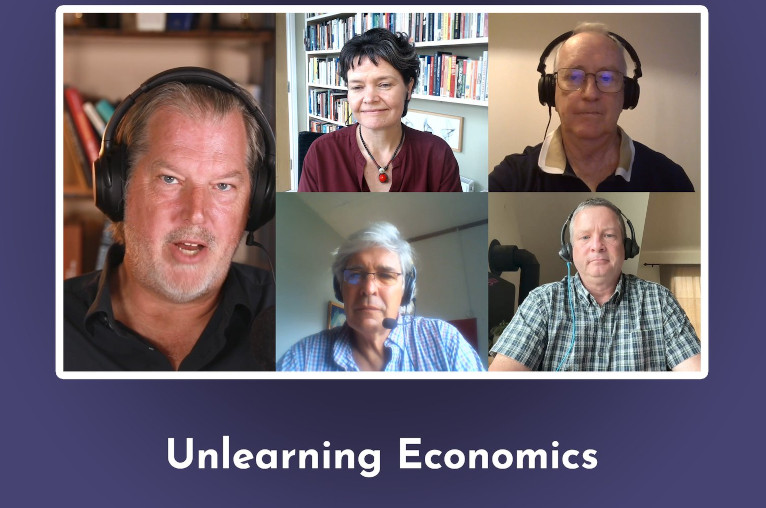(Conversation Recorded on July 18th, 2023)
Show Summary
On this Reality Roundtable, Nate is joined by Jon Erickson, Josh Farley, Steve Keen, and Kate Raworth – all of whom are leading thinkers and educators in the field of heterodox economics. In this lively discussion, each guest begins by sharing one fundamental aspect of what conventional economics gets wrong and how it could be improved in our education system. What basic assumptions about humans have led to a misunderstanding of the average person’s decision making? What areas has economics turned a blindspot to as the foundation of our economic systems? Who is finding the models and systems that economists have created useful – and how does economics as a discipline need to change in the face of a lower energy future? In short, what we teach our 18-22 year olds around the world matters – a great deal.
About Jon Erickson
Jon Erickson is the David Blittersdorf Professor of Sustainability Science & Policy at the University of Vermont. He has published widely on energy and climate change policy, land conservation, watershed planning, environmental public health, and the theory and practice of ecological economics. He advised presidential candidate Bernie Sanders on economics and energy issues.
About Josh Farley
Joshua Farley is an ecological economist and Professor in Community Development & Applied Economics and Public Administration at the University of Vermont. He is the President of the International Society for Ecological Economics.
About Steve Keen
Steve Keen is an economist, author of Debunking Economics and The New Economics: A Manifesto. He is a Research Fellow at the Institute for Strategy, Resilience, and Security at University College in London.
About Kate Raworth
Kate Raworth describes herself as a renegade economist focused on making economics fit for 21st century realities. She is the creator of the Doughnut of social and planetary boundaries, and co-founder of Doughnut Economics Action Lab, based on her best-selling book Doughnut Economics: 7 Ways to Think Like a 21st Century Economist. Kate is a Senior Associate at Oxford University’s Environmental Change Institute, where she teaches on the Masters in Environmental Change and Management. She is also Professor of Practice at Amsterdam University of Applied Sciences. She is a member of the Club of Rome and currently serves on the World Health Organisation Council on the Economics of Health for All.
Watch on YouTube
Show Notes & Links to Learn More:
00:00 – Jonathan Erickson works, info, & TGS Episode. Josh Farley works, info, & TGS Episode 1 + 2. Steve Keen works, info, & TGS Episode. Kate Raworth works, info, & TGS Episode.
02:30 – 235 million university students globally
04:53 – Paul Samuelson
07:03 – George E.P. Box
08:39 – Homo economicus
10:20 – Marginal Benefit equals Marginal Costs
10:56 – Robert Frank, Economic Naturalism
11:54 – Normalcy Bias, Asymmetric Insight, Hindsight Bias
13:02 – How Well Do Economists Forecasts Recessions | IMF
14:36 – Teaching that humans are inherently selfish increases selfish behavior
15:17 – Thorstein Veblen
16:07 – Evolution is driven by both competition and cooperation
16:36 – Is It Good to Cooperate? | Testing the Theory of Morality-as-Cooperation in 60 Societies
17:25 – Charles Darwin discourse with economists
19:09 – E.O. Wilson, Consilience
21:02 – Demand Curve, Hicksian-compensated demand curve, Market demand curve
21:21 – Sonnenschein, Shafer – The market demand curve can be represented by any polynomial
22:22 – Max Planck
22:56 – Scientology
24:07 – William Nordhaus, Nobel Prize Paper
25:32 – Correlation between energy and economic growth
26:38 – Leontief Model
26:55 – Neoclassical Economics
27:52 – Bachmann et al. 2022 Paper
29:20 – Cobb-Douglas Production Function
33:10 – Data on energy and GDP correlation globally and by country
36:20 – Galileo and Kepler correspondence
37:10 – Work potential in a barrel of oil in Kilowatt hours
37:50 – Annual change in private debt against change in unemployment correlation
38:42 – Schelling
29:10 – Every product is supported by oil
46:09 – Optimal Utility Maximization
48:20 – Record food profits 2022
48:31 – Betting on the future of food: A quantitative model of food prices
49:31 – 2 year time lag between oil investment and production, 1 year for food
50:45 – Small increase in the price of essential resources causes all prices to skyrocket
51:40 – Ecological impacts of economic activities
52:49 – In essential resources you make more money by producing less
53:14 – Enron collusion to withdraw power from the California system, skyrocketing prices
53:38 – Brazil electric crisis managed by rationing
55:38 – Adam Smith
56:39 – Universal Basic Income
57:24 – Universal Healthcare
57:31 – 20% of US GDP goes to healthcare
57:44 – 6.7% of US income goes to food for home consumption
58:32 – Agriculture is the biggest threat to global ecosystems
1:02:33 – Monsanto and GMO seed rights of use restrictions
1:02:45 – Publicly developed innovation brings more return on investment than privately developed
1:04:03 – Understanding the Private-Public Divide
1:04:11 – Payback Period
1:04:20 – Dynamic Economic Systems: A Post Keynesian Approach – John Blatt
1:04:59 – Ecocore.org
1:05:09 – Adam Hardy
1:06:58 – The Inefficiency and Unfairness of Tradeable CO2 Permits
1:07:15 – Henry Shue
1:07:29 – Pareto-optimality
1:08:04 – Law Diminishing Marginal Returns
1:10:09 – Alan Kirman: The Intrinsic Limits of Modern Economic Theory: The Emperor has No Clothes
1:18:50 – Diversity in the field of economics
1:21:41 – Elinor Ostrom – Core Design Principles
1:23:29 – Physiocrats
1:31:41 – International Baccalaureate
1:32:15 – Ecological Economics
1:33:58 – Education as an inoculation of consumers
1:34:13 – Next Systems Reader
1:36:36 – Minskey on SourceForge
1:37:04 – Leadership for the Ecozoic
1:38:30 – Doughnut Economics






